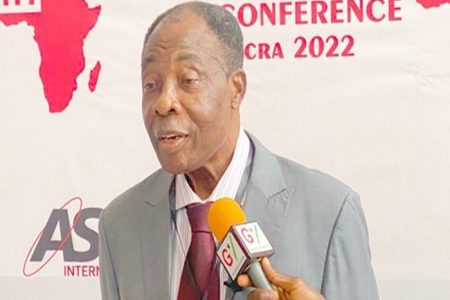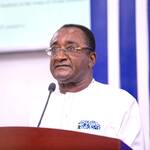A former National Security Advisor, Mr. Francis Poku Esq, has issued a stark warning about rising cases of corruption, youth unemployment, simmering internal conflicts, illegal mining, and geopolitical tensions, which he says are high alerts threatening Ghana’s democratic stability.
He predicted that Ghana risks facing “another history” if significant democratic reforms are not made by 2025.
He warned, “People are losing hope and gradually losing confidence in democracy. If the phase of democracy does not change after 2025, we are going to go through another history.
He gave the warning at the Republic Day lecture organised by OneGhana Movement on the topic “Reflections on the Democratic Control Over the Military: A Way Forward for Sustainability” at the Ghana Armed Forces Command Staff College in Accra,
Mr. Poku referenced the 1979 revolution, emphasizing how warnings and advice to prevent it were ignored.
“Three years before [the 1979 coup], we had predicted the revolution clearly,” he said.
“If that advice had been heeded, Ghana would have been a different country by now. We were going through a period of what you call anocracy—when you have a strong person who knows how to get rid of the rules. So, when he is not there, all kinds of things open up, anger and factionalism come up again, and governments don’t survive.”
He continued by citing the period after Dr. Kwame Nkrumah’s coup, noting that governments did not last for more than 27 months until the 1992 constitution.
Mr. Poku stressed the urgent need for introspection and to “anticipate what is to come,” emphasizing the importance of good governance, national integrity, respect for human rights, and the rule of law to safeguard Ghana’s growing democracy.
Mr. Poku praised the military’s involvement in combating organized crime, cybercrimes, and national emergencies, highlighting the need for necessary state investments to ensure optimal national security.
He also warned against the politicization of military operations, advocating for constant collaboration and stakeholder engagement.
“I advise that there must be communication… the military must be accountable to the president and, in principle, the state at all times,” he stressed.
In advocating for democratic control of the military, Mr. Poku argued that this would ensure accountability to citizens by providing adequate logistics and equipment through lawful representatives.
He recommended government resources for modernizing the military and suggested that the armed forces contribute to youth employment through government-supported initiatives. “There may come a time where we would have an armed forces university… move away from the use of force to engagement with the mind and the intellect,” he said.
Prof. Kwesi Anin on corruption and oversight failures
In the same lecture series, security consultant Prof. Kwesi Anin identified corruption as a consistent and pervasive threat to Ghana’s stability.
He stressed the need for continuous analysis of corruption’s impact and the development of effective response strategies. Additionally, he highlighted other evolving threats, such as violent extremism and sanitation issues, which require adaptive and comprehensive threat assessments.
Prof. Anin criticized Ghana’s oversight institutions for failing to effectively supervise the security sector, particularly the military.
He emphasized that those in power must understand their constitutional authority, demonstrate the ability to deliver on their responsibilities, and maintain integrity, courage, and vision.
Prof. Anin pointed out that many oversight bodies have not fulfilled their mandates, leading to a gap in democratic control over the military.
Since 1992, there has been a requirement for annual performance reports from these institutions, but many have failed to comply.
Prof. Anin emphasized the need for parliament to engage more actively in security debates and for robust mechanisms to ensure oversight institutions fulfill their roles.
This lack of accountability, he argued, undermines the legitimacy and effectiveness of the security sector.
Furthermore, Prof. Anin highlighted the importance of balancing military expenditure with developmental needs and called for clear communication about the military’s role in development.
He stated that this balance is crucial for maintaining public trust and ensuring that the military contributes positively to national development without overshadowing essential public services.
Josephine Nkrumah’s address
Josephine Nkrumah, in her lecture, also emphasized the importance of not being complacent about the stability experienced since 1992, warning that current and global circumstances impact national security.
She highlighted the need to address both internal and external security threats by enhancing civil-military relations and ensuring that security forces are accountable to civilian authorities.
This approach, she said, requires a whole-of-government and whole-of-society strategy, as well as respect for human rights, the rule of law, and gender mainstreaming.
She pointed out that democratic oversight of the military is enshrined in Ghana’s constitution and reinforced by the ECOWAS protocol on democracy and good governance.
This protocol mandates that armed forces and security agencies are under the authority of legally constituted civil authorities.
Mrs. Nkrumah called for reflection on the role of ECOWAS, emphasizing that it is composed of heads of state who make decisions on behalf of the region.
She urged scrutiny of sub-regional leadership and encouraged asking hard questions about their roles and decisions.
Maj. Gen Matthew Essien’s comments
Major General (Maj Gen) Matthew Essien said the ultimate goal of the lecture series is to build a military that is not only effective in its primary mission of defending the nation but also operates in harmony with the values and principles of democracy.
“It is through such a symbiotic relationship that we can truly achieve sustainable security and peace for our nation.”
He was hopeful that the lecture series would afford the opportunity to create a space for dialogue and exchange ideas that transcends disciplinary boundaries and inspire creative thinking.
“By harnessing the collective wisdom and expertise of our speakers, faculty members, students, and guests, we hope to ignite a commitment to excellence in the field of defense, peace, and security studies.”
- Friday, April 25, 2025 Newspaper Headlines - 25 April 2025
- Valeria, the amputee giving 1,000 other amputees new life - 25 April 2025
- Moses Baiden calls for unified African tech strategy - 25 April 2025

